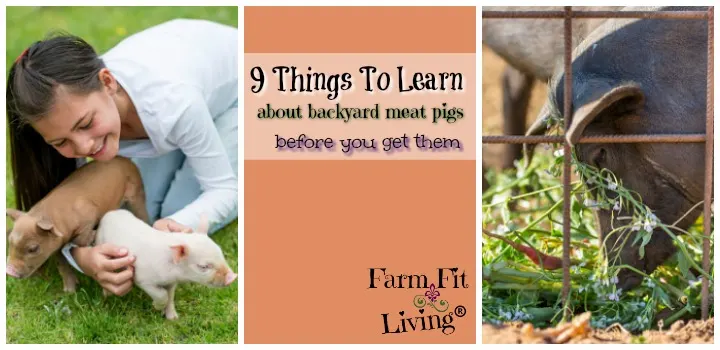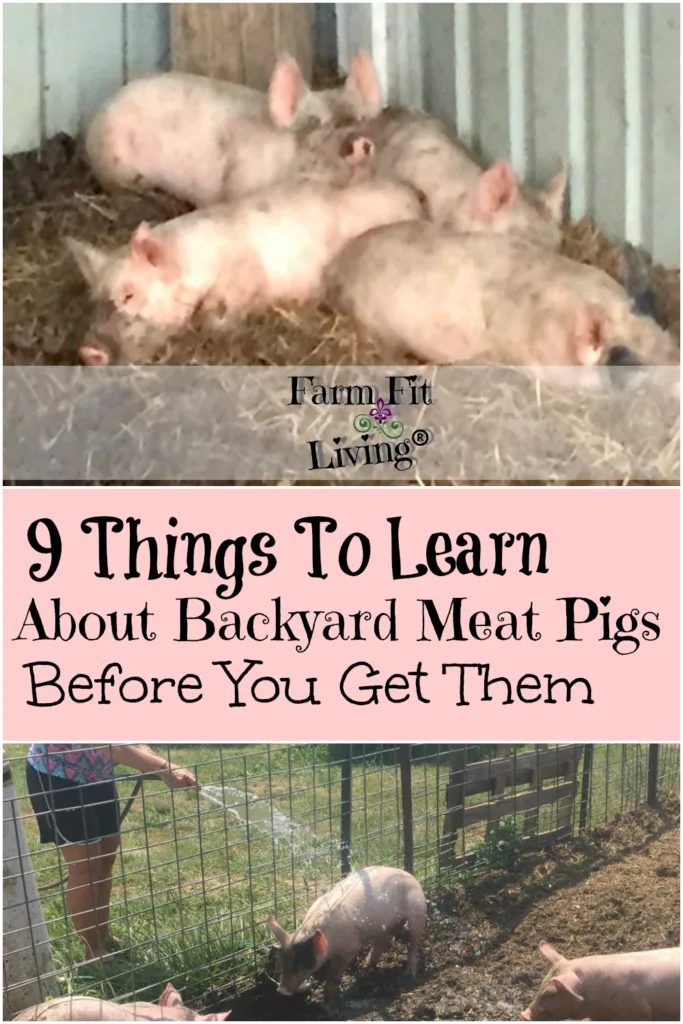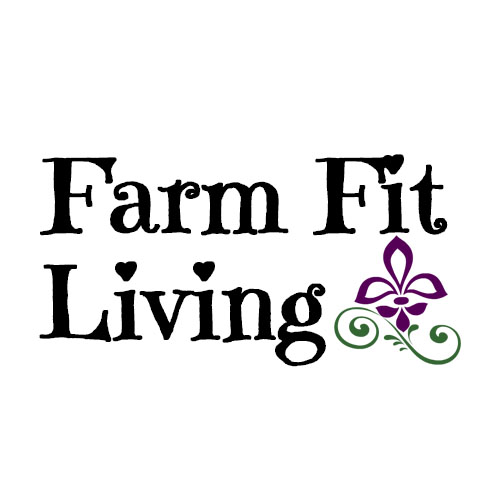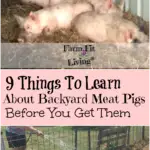Looking for things to learn about backyard pigs before acquiring them?
Things to learn about backyard pigs are simple but important. If you’re wanting to raise pigs for some fresh delicious pork later on, the good news is that you probably can. But first, I would suggest learning about how to raise a pig for meat and what makes them so quirky. Here’s what this post will include:
- Pig raising basics including things to learn about backyard pigs
- Pig Pen Plans
- Pig care and management for raising pigs successfully
- Ways to enjoy raising your own pork.
Here are 9 things to learn about backyard pigs before you get them.
Listen to the Podcast Episode:

First of all, Pigs Are SMART
They are super smart. And they know it. This will make you love them and hate them. It will also want to make you watch them for hours. They will do things like:
– Go to the bathroom in exactly the same spot as before. They potty train themselves!
– Dig a 5-foot deep hole in the middle of their pen to stay cool during the summer.
– Strategically dig escape holes next to the fence that you will have to patch later.
– Move their water tanks around to where you can’t reach them to give them water.
And the list goes on and on. Believe me, pigs can be aggravating little things. You’ll wonder just how they thought of that. And that’s why you should always be thinking one step ahead of your pigs. Always looking for things to learn about backyard pigs.
So, with that said, you’ll need to learn how to think like a pig. But, you definitely don’t have to smell like one.
You Might Think Pigs Stink
What’s that smell? Oh…haha. That’s just your pigs. Just another one of those things to learn about backyard pigs.
To be honest, pigs are very clean animals. At least they try really hard to be. So, what are some ways you can keep the pigs from stinking? Or even to keep you from stinking like a pig?
First of all, you wouldn’t have to go into the pen if you don’t have to. Set up everything to where you can care for pigs outside of the pen. For example: * Feeders can be tied to the fence to dump feed into.
* Waterers can also be placed strategically either inside or outside of the pen. Just make sure they can reach the nipple to drink.
Then, keep a grassy area for the pigs. You can try this, but I guarantee you that they will be spending more time in the mud than the grass area. They just love mud.
Finally, peppermint removes the pig smell. Again, what the pigs eat is a high determinant of what they will smell like. And you’ll find out what their vast diet is very soon. Of course, you’ll need to find out things to learn about backyard pigs in terms of their diet. They really can (and will) eat just about anything!
Pigs Have a Very Unique Diet
There are multiple ways to feed pigs because their diet is so unique. Here are some diets pigs can eat:
– Pasture/ Hay
– Produce
– Local Grain Protein mix
– Grubs, earthworms and soil grubs
– Snacks such as: Big Marshmallows, Animal Crackers, Donuts, etc.
See? Lots of different things! They just need plenty of protein, carbs and other nutrients that they can obtain from many different types of food. It’s definitely important to make sure the pigs have plenty of room in their pen. And to have excellent fences. And maybe some backups since pigs love to destroy everything.
Pigs Like to Destroy Property
Why do pigs love to destroy things? Well, I believe it is because they are smart. And they get bored from day to day. For sure, pigs need a good fence they will stay in. I’ll talk more about fencing in the next section, but I wanted to stress just how important it really is.
I also wanted to suggest putting some toys in their pen for them. Pigs are very playful and fun. Having some toys might just deter their minds away from wanting to break out of their pen.
But, even with the toys, great fencing is key.
Pig Pens Must Have Good Fencing
When you think it’s solid… Reinforce it.
A nice sturdy fence is the key to keeping them in:
- Cattle Panels
- Hog Panels
- Electric Fencing (On the inside of the cattle or hot panels).
- Solid Sides
Are just a few ways to keep pigs contained. They can still try to dig their way out, though. So, keep watch intently.
The fencing must be:
– Secure at the bottom.
– Strong enough they can’t chew through.
– Sturdy enough pigs can’t crawl through.
So, I highly believe a good fence will keep pigs safe and sound while in your care. Free-ranging pigs might be ok for some. But, for me it’s not an option since our land is right off of a major highway. Therefore, I will be keeping my pigs contained in a strong and sturdy fence. I also allow my pigs all the mud they want.
Pigs Need Shelter & Mud
On hot or cold days, pigs must be protected. Shelter can really help protect pigs from the elements. Plus, pigs don’t sweat so summertime care is extremely important or else pigs will overheat easily.
And they love mud baths in the summer time. Here are some more ways to keep pigs cool during summer. And in the wintertime, pigs need to be kept warm.
So, they burrow into bedding inside their shelter. Here are some more ways to keep pigs warm during winter. Even in the wintertime, pigs desire water. You must understand how important water is to every living humans all year long.
Pigs Must Have Access to Plenty of Water
They drink a LOT of water! You can put the water in just about any sort of tank or tub for them to drink out of.
Our pig water tank is a large tub with a pig nipple attached. We keep the tank on the outside of the fence with the nipple sticking through. This is so they don’t destroy the water tank.
It also prevents pigs from knocking you over if you go into their pen. Pigs can be playful, but they do become big. And that is when you need to watch out for the snout. The good thing about pigs is that they are smart enough to be trained to use any equipment you set up for them.

Because Pigs Are Smart, You Can Train Them
You can train your pigs to do a number of things.
If you’re using electric fence, you can train them to respect it.
You can also train them to go onto the trailer. This will help immensely for when you’re trying to load 300+ pound pigs onto the trailer. Finally, you can train them to go where you want them to go. You do this by driving them or using a pig driving stick to gently tap or detour them slightly the other direction.
Another good piece of equipment to use when handling pigs is a chute or a slap shot system. If your pigs are sick and you need to give them a shot, keeping them contained is important. You don’t want to be giving them a shot while they are trying to bite you or run away. Better safe than sorry! For both you and the pigs. You’ll soon find out that the most important tool and defense mechanism a pig has is its muscular snout.
Watch out for that Snout!
Their snouts are incredibly strong. The snout is like a muscle. It is strong and pigs use it for many different things. Here are a few things pigs use their snout for:
– To Dig in the dirt
– Pull something up (Like the bottom of the fence)
– Move something heavy
– To bite you if you’re not paying attention.
And many more ways. That last one is a doozy. I usually don’t even go into the pen with the pigs once they get to a certain size. No, I’ve never been bitten by my pigs. But 250 pound pigs chasing me around and trying to knock me over with their snouts are the least of my worries.
So, I’m prepared to enter the pen when needed and care for the pigs if needed. But, until then, I prefer to watch them from outside of the pen. They are fun to watch.
Pigs are FUN in General!
Pigs have play time just like any other species of life. They run races. Play hide and seek.
But their favorite game is to race through the water from the hose in the summertime. Again, pigs don’t sweat. So, I squirt them down really well in the summertime to keep them cool.
That is the fun part of raising pigs. Caring for them is playing with them. And they appreciate it greatly.
Don’t ever be too busy to play with the pigs!
And they are tasty, too
Pork is a delicious and healthy protein. It’s very versatile. From our pigs we get lots of meat:
- Bacon
- Sausage
- Chops
- Steak
- Ham
- Loin
Delicious! The main thing to learn about backyard pigs before you get them is that someday, they are going to die. And you might eat your pigs. Whether they are butchered for meat or they die of natural causes, they will die. Why not have a solid plan in place for slicing up the pork for your freezer?
So, before you even get your pigs, make a plan for them. Our pigs are solely here on our homestead to eventually feed us when they are physically ready. We also feed some other pigs out for family and friends. When all the pigs are ready, they are loaded onto the trailer and taken to our local locker plant. And in about two weeks, the meat is fresh and ready for pick up.
But, you might just want a pig for a pet. This is just fine and dandy. But, you still have to have a plan for your pet pig at the end of its life. Again, it’s one of the most important things to learn about backyard pigs.
Raising Backyard Pigs is an Interesting Process
So, I wanted to share with you 9 things to learn about backyard pigs before you get them. Why should you?
Because you’re acquiring living things. You have to keep your pigs safe, healthy, and fed. You must keep your pigs contained in some way.
And you must have fun with your pigs. Finally, you have to have a plan for your pig in the end. And with that said, I hope you have an understanding about things to learn about backyard pigs.
Are you interested in getting backyard pigs on your homestead?






Raising Meat Pigs on the Homestead | Farm Fit Living
Wednesday 29th of March 2017
[…] Pigs Cool In the Summer Heat 9 Things You Need To Know About Raising Pigs for Meat (Before You Get Them) Keeping Pigs Warm in the Winter […]
How to Get Rid of Weeds in Vegetable Gardens
Friday 24th of March 2017
[…] could also fall into this category. You could use goats, sheep, chickens or pigs to graze weeds during the off season in the garden spots. So, prior to […]